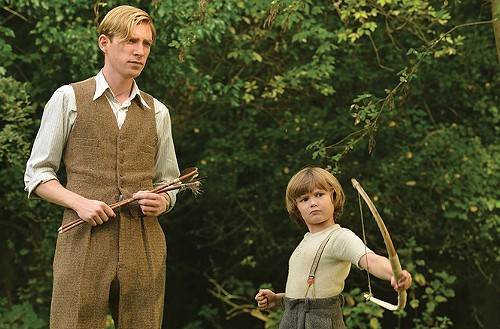Humdrum Acre Wood
Goodbye Christopher Robin is just the latest in a long line of similar biopics.
By Scott Renshaw @scottrenshawIf you so desired, you could program an entire film festival out of biopics about British authors of beloved children's stories, and how they were really quite unhappy. Dating back to 1993's C.S. Lewis tale Shadowlands, these movies now seem to pop up every few years or so to remind us that what they put forward as terribly ironic—so sad, yet so good at fanciful fictions!—has now become a cliché. Peter Pan's J.M. Barrie? You've got Finding Neverland. Peter Rabbit's Beatrix Potter? May we introduce you to Miss Potter. Mary Poppins' P.L. Travers? Saving Mr. Banks will see you now.
Thus along comes Goodbye Christopher Robin to assure us all that A.A. Milne—creator of Winnie the Pooh, Eeyore and friends—was little different in this respect. Whatever distinctive flourishes might be included, there's a sameness to the structure that makes it hard not to feel like this is more or less a fifth verse, same as the first.
It starts with a bit of narrative bounce in its step, as director Simon Curtis (the 2015 art-house hit Woman in Gold) opens with a brief prologue set in 1941 before flashing back to 1916, where Alan "A.A." Milne (Domhnall Gleeson) is returned to England and his life as a successful playwright and humorist, and to his wife Daphne (Margot Robbie), after service in World War I that left him facing occasional bouts of PTSD. That unsettled sense of time and place disappears once Daphne gives birth to their son, Christopher Robin, and the script begins to focus on how Alan and Daphne are complete crap as parents, essentially surrendering his care—perhaps in the style of the time—to his nanny, Olive (Kelly Macdonald).
The pivot point in the story comes during a stretch when a frustrated Daphne departs from their rural Sussex home to stay in London, and Olive attends to her ill mother, leaving Alan in the unfamiliar position of primary caregiver to a now 7-ish-year-old Christopher Robin (played by dimpled cherub Will Tilston), whom they call Billy. Their adventures with Billy's beloved stuffed animals in nearby Ashdown Forest form the basis for the Pooh stories, and Curtis has cinematographer Ben Smithard shoot these scenes in sunlight so dappled it seems painted into the frame. Gleeson is solid at capturing Alan's slow thaw into a man who can finally connect with his own son, though he's constrained by a script that betrays a sense of obligation to run down a checklist of items: There they are at the zoo seeing the bear called Winnie! There they are inventing Poohsticks!
The most interesting and unexpected chunk of the film follows, however, once the Pooh books become hugely popular, and turn the "Christopher Robin" who inspired them into a reluctant celebrity as his parents trot him out for various promotional events and photo ops. For a while, we get the story mostly from the point of view of young Billy, befuddled by his fame though precociously good at playing the part, even as he tries to separate himself from the fictional character who doesn't even share the name by which he knows himself. The script by Frank Cottrell Boyce and Simon Vaughan also makes the bold choice not to water down the suggestion that Alan and Daphne effectively turn their own child into a marketing prop, though that subtext is unfortunately literalized when an angry Olive speaks her mind to her oblivious employers.
That same unwillingness to let thematic ideas remain unspoken carries over as the third act focuses on 18-year-old Billy (Alex Lawther) trying to emerge from the shadow of his connection to a perpetually 7-year-old character. Curtis dispenses with Billy's years tormented by classmates in boarding schools with an efficient montage, but it's a missed opportunity to once again allow the story to really be about his experience, which he then needs to explain to his father in declarative dialogue. Goodbye Christopher Robin keeps circling back around to being about A.A. Milne—while still short-changing his psychological traumas—saying goodbye to its opportunity to carve out a unique place by being about Billy. It's just another sad British children's-author tale, to hold a space until the one about Roald Dahl arrives next year. And that's not even a joke.
More by Scott Renshaw
-
Faces of Salt Lake County book and portrait reception
Images and personal stories in a new book reveal local demographic diversity
- Apr 17, 2024
-
Feature film review: THE BEAST
A filmmaker's compelling ideas get a bit tangled in references to his creative influences.
- Apr 17, 2024
-
Film Reviews: New Releases for April 12
Civil War, Escape from Germany, Coup de Chance, Hundreds of Beavers, La Chimera, Sting
- Apr 11, 2024
- More »
Latest in Film Reviews
Readers also liked…
-
Power Plays
Two satirical comedies explore manipulations and self-delusions by those with power.
- Aug 31, 2022




